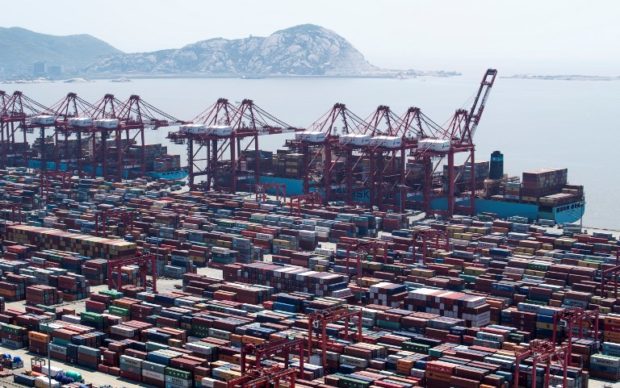US-China trade war leaves Europe as collateral damage
FRANKFURT, Germany – Like a sleek Mercedes crunched between two freight trucks, Europe’s economy is being knocked off course by the conflict between the U.S. and China over trade.

A general view of the Yangshan Deep-Water Port, an automated cargo wharf, in Shanghai on April 9, 2018. China warned that trade talks with the United States were “impossible” under current conditions after President Donald Trump reassured markets by suggesting that the dispute could be resolved. / AFP PHOTO / Johannes EISELE
The bill for damages from the U.S-China collision could be painfully high, starting this week if new growth figures on Wednesday show that Europe’s economic motor, Germany, is stalled or shrinking. Beyond that, economists say there are signs that years of jobs growth since the depths of the Great Recession and the eurozone debt crisis may be ending.
And if the trade wars escalate to include higher U.S. tariffs on cars made in Europe, the picture could look even worse.
The heart of the matter is Germany, Europe’s largest economy and a key trade partner of both the U.S. and China.
Almost half the German economy – 47%, according to World Bank estimates – comes from trade as its companies play a dominant role in global markets for luxury autos and complex industrial machinery. Supply chains from Germany extend into neighboring countries as well, while German profits are often invested in factories in places like Slovakia, Hungary and Poland. Great for Germany and Europe when trade is booming — but it means Germany remains more vulnerable than less open economies such as Portugal or France to a slowdown in global trade in goods and services.
And that is what’s happening.
German has spewed wretched economic data for weeks: an 8% annual fall in exports in June, a 1.5% drop in industrial production in June from the month before, three times bigger than expected. Surveys of company executives suggest the industrial sector is in recession, with consumer demand and services propping up the economy.
But the damage from trade may be spreading to consumers and companies that do business only at home. While unemployment remains low at 3.1%, job gains have stalled recently.
Ironically, trade between Germany and the U.S. and between Germany and China is holding up pretty well. It’s mainly the uncertainty about the outcome of the clash between U.S. President Donald Trump and the Chinese Communist leadership that has been weighing on business confidence and deterring decisions to invest and buy across global markets. Last week, Trump imposed a 10% tariff on an additional $300 billion in Chinese goods effective Sept. 1.
As a result, research firm Oxford Economics forecasts world trade growth of just 1.2% this year, far below last year’s 4.9% rise.
There are a few small benefits for Europe. While the U.S. and China ramped up barriers against each other, the U.S. has largely kept tariffs on European products the same, except for introducing charges on steel and aluminum imports. China has actually lowered charges on exports from the 19 European countries that use the euro. /gsg